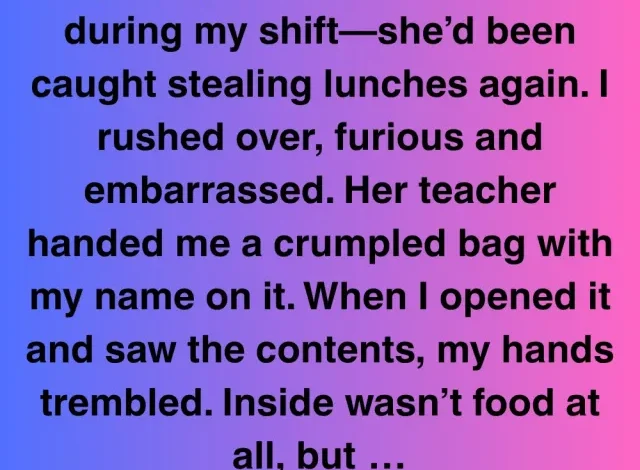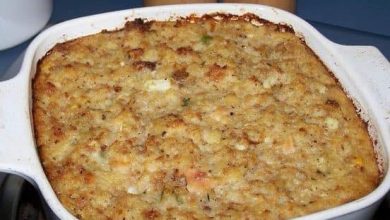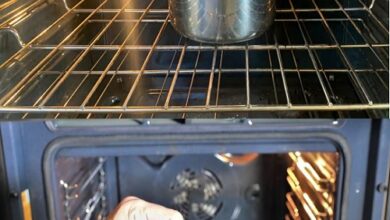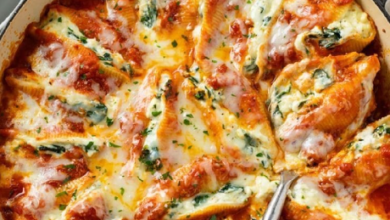The Crumpled Bag

ADVERTISEMENT
It started with a phone call at work.
Thea’s school. Lunch theft—again.
I dropped my apron and raced over, cheeks hot with shame. Her teacher met me at the door with a wrinkled paper bag. My name scribbled across the front.
ADVERTISEMENT
Inside? Three old grocery lists. My handwriting.
ADVERTISEMENT
“She said she needed these,” the teacher murmured, “because you forgot her lunch again.”
I froze. I had forgotten, yes. But this—this didn’t make sense.
Outside the office, Thea sat curled up, knees hugged close. Her eyes brimmed the moment she saw me.
I knelt beside her. “Sweetheart… why?”
Her voice barely broke through. “Because I was hungry.”
My heart splintered. We scraped by on noodles, beans, and school breakfasts. I hadn’t realized she still felt empty.
We walked home in silence.
Then, halfway there, she whispered, “I just didn’t want them to laugh. I wanted it to look like you packed something.”
Not just hunger. Shame.
At home, I warmed leftover rice and eggs. We ate quietly.
“Why didn’t you tell me?” I asked.
“I didn’t want you to feel bad.”
That night, I opened the budget notebook. I’d stretched every coin thin, but it wasn’t enough.
The next morning, I met the school counselor. She listened. Then she offered help: a weekend meal kit program for families like ours.
I signed up.
And I started adding little notes to Thea’s lunches: Love you. Can’t wait to hear about your art class.
She stopped taking food that wasn’t hers.
A few weeks later, she came home quiet again. Another kid’s lunch had vanished. She’d seen the boy who took it. He looked scared.
“So I gave him my juice box,” she said.
Was she giving away her food?
“Just the snacks,” she shrugged. “We get enough now, right?”
I didn’t know whether to lecture her or hold her tight. So I did both.
Suddenly, I began noticing things—coworkers skipping meals, neighbors stretching dinners. People surviving.
Then I saw a flyer: Parent Volunteers Needed — Community Pantry Night.
I showed up. No ID required. Just crates of produce and stacks of milk cartons. Camila from the church smiled and gave me a lift home.
That night, I realized: I couldn’t always give money. But I could show up. I had hands. I could help.
Soon I was unpacking crates every week.
At spring open house, Thea’s teacher pulled me aside.
“She checks on kids during lunch,” she said. “She shares quietly. Kindly.”
I cried.
That night, Thea brought home a ceramic bowl from art class. On it, she wrote:
No one should eat alone.
We weren’t wealthy. I still worked two jobs. But something was shifting.
Then my boss surprised me—a promotion to night supervisor. Steady hours. A small raise.
“Does this mean we can get real cheese again?” Thea asked.
I laughed. “Even strawberries—if they’re on sale.”
Volunteering became routine. Camila and I became close. But summer brought new challenges: donations slowed, needs grew.
So I made flyers. Hung them at the diner, on laundromat walls, bus stops.
Donations poured in.
Bakeries dropped off bread. Farmers delivered crates. One Uber driver donated ten cases of water—he’d gotten a big tip and wanted to share the luck.
Then came the letter. Funding cuts. The pantry program might be shut down.
“We won’t let that happen,” Camila said.
We rallied. A community potluck. Kids made posters: Food is a right. Thank you for feeding us.
The news picked it up. I showed the reporter one of those crumpled lunch bag papers.
“My daughter didn’t need food that day,” I said. “She needed dignity. And this pantry gave her that.”
The donations came back. The board relented.
The pantry stayed open.
One autumn morning, I found a note on my pillow:
Thank you for fighting for kids like me. Love, T.
I cried—not out of pride, but relief. We were going to be okay.
Now, two years later, I help train new volunteers. Thea’s thriving. Still packs extra snacks “just in case.”
Giving isn’t always money.
Sometimes it’s showing up.
Sometimes it’s slipping a note into a lunch bag.
And sometimes, it’s a crumpled empty bag that reminds you what really matters.




